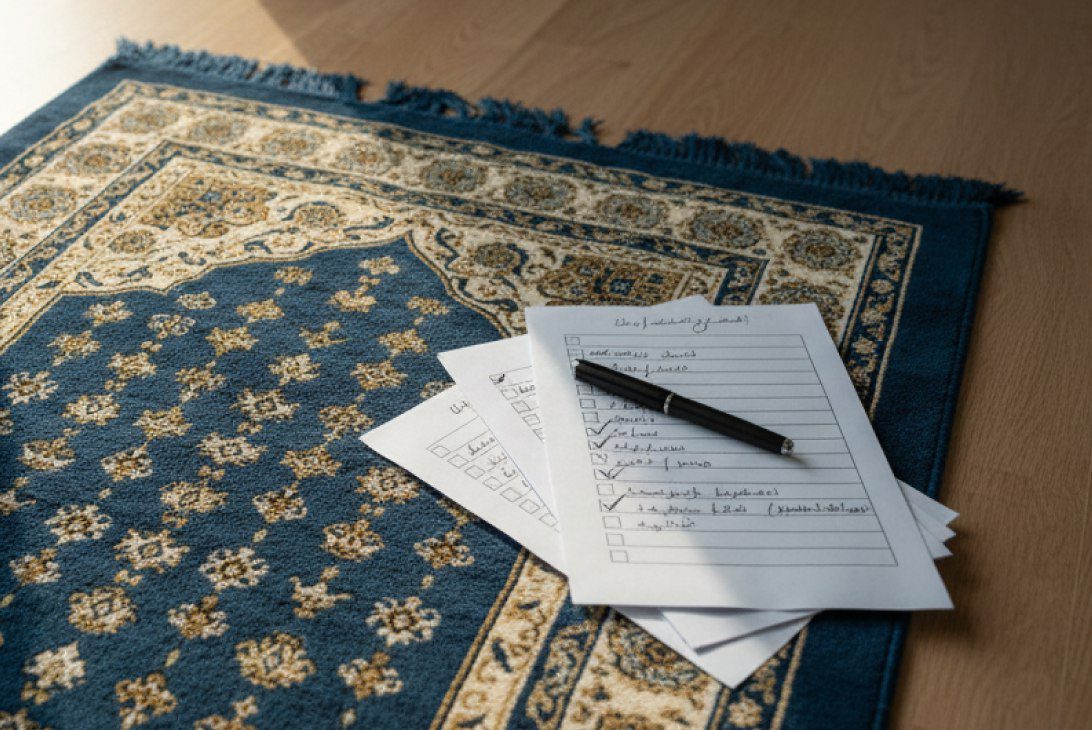Surah al-Anbiyā is known by some scholars as ‘the Surah of Answered Prayers’. It is the only sūrah in the Qur’an where the phrase ‘فَاسْتَجَبْنَا لَهُ’ (So We responded to him) is repeated multiple times. Within it, Allah ﷻ highlights the heartfelt supplications of three Prophets: Ayyūb, Yunus, and Zakariyyā (ʿalayhim as-salām), and after each duʿā’, He affirms, “So We responded to him.” And thereafter, Allah reveals the secret behind why their duʿās were accepted: a timeless key for anyone seeking His response.
One of the most powerful ways to know Allah (maʿrifah) is by reflecting on the servitude (ʿubūdiyyah) of those who knew Him best: His Prophets (ʿalayhim as-salām). Their worship, their heartfelt supplications and their deep humility reveal the depth of their knowledge and awareness of Allah. By reflecting on their supplications, we begin to understand who Allah truly is. Their devotion was not just ritual; it reflected their deep awareness of His majesty, beauty and closeness.
There are deep lessons in each of these supplications: lessons in humility, trust, patience and worship which we can learn from and embody in our own lives and supplications.
The Duʿa of Ayyub (ʿalayhi as-salām): Supplication in Distress
Prophet Ayyūb (ʿalayhi as-salām) endured eighteen years of severe and prolonged illness, during which every part of his body suffered immense pain. Once healthy and wealthy, he was stripped of everything: his health, wealth, children, and even the company of people except for his devoted wife.
Despite such overwhelming hardship, Ayyūb (ʿalayhi as-salām) never expressed resentment nor questioned Allah’s decree. Instead, his supplication reflected deep humility, steadfast faith and sincere reverence. He said:
…أَنِّيْ مَسَّنِيَ الضُّرُّ وَأَنْتَ أَرْحَمُ الرّٰحِمِيْن
“…Indeed adversity has touched me, and you are the Most Merciful of the merciful” (21:83).
Notice the profound adab (etiquette) in his words. He acknowledged his suffering without complaint or blame. He did not ask explicitly for healing, yet his duʿā’ carried the weight of a heart fully surrendered to Allah, trusting in His mercy and power. This is the essence of refined supplication: to speak with humility, love, and reverence to the One who alone controls every matter.
Allah’s response to Ayyūb (ʿalayhi as-salām) was not only granting relief but also abundant blessing: “So We responded to him, removed his adversity, and restored his family to him, along with others like them, as a mercy from Us and a reminder for Our worshippers” (21:84).
The story of Ayyūb (ʿalayhi as-salām) teaches us that true duʿā’ begins with praise and acknowledgment of Allah’s mercy and power, even in the darkest times. It reminds us to maintain respect and reverence in our supplications, and to hold firm hope that Allah’s mercy is always near.
Ibn al-Qayyim (raḥimahullāh) explains, “This duʿā’ combines the essence of tawḥīd, the display of need and poverty before one’s Lord, the sweetness of love expressed through humble pleading (tamalluq), the acknowledgment of Allah’s attribute of mercy — that He is the Most Merciful of those who show mercy — and supplicating to Him through His attributes, along with one’s intense poverty and need for Allah. Whenever the afflicted person experiences this (state), his trial is lifted.”
The Duʿa of Yunus (ʿalayhi as-salām): Supplication in Isolation
When Prophet Yūnus (ʿalayhi as-salām) was swallowed by the whale, he found himself utterly alone, surrounded by layers of darkness: the darkness of the night, the sea, and the whale’s belly. In that unimaginable isolation, he called out to His Lord with a duʿā’ that pierced through every barrier:
لَآ إِلٰهَ إِلَّآ أَنْتَ سُبْحَانَكَ إِنِّيْ كُنْتُ مِنَ الظَّالِمِيْنَ
“…There is no god worthy of worship except You. You are free from imperfection. Indeed, I have been of the wrongdoers” (21:87).
What’s truly remarkable is that Yūnus (ʿalayhi as-salām) made no direct request for relief or rescue. Instead, his duʿā’ was an expression of pure submission: affirming Allah’s Oneness and perfection while admitting his own mistake. In simply describing his condition, he was making a profound appeal for forgiveness: one filled with humility, repentance and awe.
This supplication encapsulates four key elements of a powerful duʿā’: tawḥīd, glorification, servitude, and admission of one’s faults. Through these qualities, prayers ascend to the Throne of Allah.
Calling upon Allah through His Oneness is among the most powerful forms of supplication. Nothing repels hardships more effectively than tawḥīd. That’s why this duʿā’ of distress is centred around it.
And Allah responded. Not only did He save Yūnus from the whale, but also from his sorrow: “So We responded to him and saved him from the distress. And thus do We save the believers” (21:88). Many are delivered from their trials yet remain burdened by pain for years. Yūnus ﷺ was freed from both.
And this isn’t just his story. It’s a timeless promise: “And thus do We save the believers” (21:88). Whoever turns to Allah with sincerity, however bleak their situation, will find a Lord who listens, heals and rescues from both seen and unseen pain. The Prophet ﷺ said that no one supplicates with this duʿā’ except that his supplication is accepted. And nobody supplicates with it except that Allah removes his difficulties” (Tirmidhī).
The Duʿa of Zakariyya (ʿalayhi as-salām): Supplication Despite Impossibility
Prophet Zakariyyā (ʿalayhi as-salām) and his wife were both old, beyond any capacity to have children. By every physical measure, having a child seemed impossible. But Zakariyyā knew that nothing is impossible for Allah. He called out to his Lord:
رَبِّ لا تَذَرْنِي فَرْدًا وَأَنْتَ خَيْرُ الْوَارِثِينَ
“…My Lord, do not leave me alone [childless], though You are the best of inheritors” (21:89).
And Allah responded: “So We answered him, and We granted him Yaḥyā…” (21:90).
Allah did not give him just any child, but a pure, righteous Prophet. Allah healed his wife’s barrenness and honoured them both in old age with the joy of a pious son.
The story of Zakariyyā (ʿalayhi as-salām) is a timeless reminder that even the Prophets faced deep personal hardships, and their response was always duʿā’.
Duʿā’ is not only for times when the outcome looks possible. It is especially for the moments that seem impossible. No matter how unlikely the circumstances, never give up on duʿā’. Allah responds in ways beyond imagination, and often at times when we least expect it.
The Secret Behind Accepted Duʿa
What made the prayers of the Prophets so effective? Immediately after granting Zakariyyā’s request, Allah reveals the qualities that made his and the other Prophets’ duʿās so powerful:
“Indeed, they used to hasten to do good deeds, and they would call upon Us with hope and fear, and they were humbly submissive to Us” (21:90).
This verse highlights three powerful qualities behind accepted duʿāʾ:
1. Rushing to Do Good Deeds: The Prophets were always the first to act, eagerly rushing to perform whatever pleases Allah. The word “yusāriʿūn” highlights their intensity and urgency in seeking goodness. Their lives were rooted in constant worship and obedience, always striving to glorify Allah. This eagerness and devotion was a key reason their prayers were accepted.
Allah ﷻ says about Prophet Yunūs, “Had he not been of those who glorify Allah, he would have remained in its belly until the Day they are resurrected” (37:143–144). This verse teaches us that Yūnus (ʿalayhis-salām) was saved because he was among those who regularly glorified Allah and did good deeds during times of ease. His constant remembrance of Allah before facing hardship was the reason for his rescue during his trial.
2. Always Praying with Hope and Fear: The Prophets prayed with hearts filled with deep longing for Allah’s reward and fearing His punishment. This balance between hope and fear is a key secret of sincere supplication.
Similarly, they turned to Him in all circumstances, whether in ease or hardship. For them, duʿā’ wasn’t limited to moments of hardship; rather it was part of their daily lives.
3. Humility and Reverence Before Allah: The Prophets prayed with broken hearts and deep humility, fully submitting themselves to Allah. They removed all pride and arrogance, knowing that true khushūʿ (reverence and humility) is essential, not only in duʿā’ but in everyday life. A heart that surrenders sincerely to Allah is one whose supplication is most likely to be accepted.
Acceptance of duʿā’ is not limited to Prophets. Allah ﷻ made that clear when He responded to Ayyub, saying: “As a mercy from Us, and a reminder for the worshippers.” When He responded to Yunus, He said: “And thus do We save the believers.” So any believer who follows their path — rushes to do good, prays with hope and fear, and remains humble — is also among those whom Allah will respond to.
May we strive to embody these qualities so that our hearts may draw near to Allah, and our supplications be answered.






